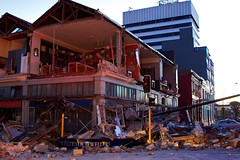
Search
Images for New Zealand; more images...
Facing being on shaky ground: Exploring the concept of courage through old…
Research papers, The University of Auckland Library
Courage has remained an elusive concept to define despite having been in the English lexicon for hundreds of years. The Canterbury earthquake sequence that began in 2010 provided a unique context in which to undertake research that would contribute to further conceptualisation of courage. This qualitative study was undertaken in Christchurch, New Zealand, with adults over the age of 70 who experienced the Canterbury earthquakes and continued to live in the Canterbury region. The population group was chosen because it is an under researched group in post-disaster environments, and one that offers valuable insights because of members' length and breadth of life experiences, and likely reminiscent and reflective life stage. A constructivist grounded theory approach was utilised, with data collected through semi-structured focus groups and individual key informant interviews. The common adverse experience of the participants initially discussed was the earthquakes, which was followed by exploration of courage in their other lived experiences. Through an inductive process of data analysis, conceptual categories were identified, which when further analysed and integrated, contributed to a definition of courage. The definition was subsequently discussed with social work professionals who had remained working in the Canterbury region after experiencing the earthquakes. From the examples and the actions described within these, a process model was developed to support the application of courage. The model includes five steps: recognising an adverse situation, making a conscious decision to act, accessing sources of motivation, mastering emotion and taking action. Defining and utilising courage can help people to face adversity associated with everyday life and ultimately supports self-actualisation and self-development. Recommendations from the study include teaching about courage within social work education, utilising the process model within supervision, intentionally involving older adults in emergency management planning and developing specific social work tasks in hospital settings following a disaster.
Ongoing Community Resilience from the Ground Up: A Relational Place Based …
Research papers, Victoria University of Wellington
When the devastating 6.3 magnitude earthquake hit Christchurch, Aotearoa New Zealand, at 12.51pm on 22nd February 2011, the psychological and physical landscape was irrevocably changed. In the days and weeks following the disaster communities were isolated due to failed infrastructure, continuing aftershocks and the extensive search and rescue effort which focussed resources on the central business district. In such moments the resilience of a community is truly tested. This research discusses the role of grassroots community groups in facilitating community resilience during the Christchurch 2010/11 earthquakes and the role of place in doing so. I argue that place specific strategies for urban resilience need to be enacted from a grassroots level while being supported by broader policies and agencies. Using a case study of Project Lyttelton – a group aspiring towards a resilient sustainable future who were caught at the epicentre of the February earthquake – I demonstrate the role of a community group in creating resilience through self-organised place specific action during a disaster. The group provided emotional care, basic facilities and rebuilding assistance to the residents of Lyttelton, proving to be an invaluable asset. These actions are closely linked to the characteristics of social support and social learning that have been identified as important to socio-ecological resilience. In addition this research will seek to understand and explore the nuances of place and identity and its role in shaping resilience to such dis-placing events. Drawing on community narratives of the displacement of place identity, the potential for a progressive sense of place as instigated by local groups will be investigated as an avenue for adaptation by communities at risk of disaster and place destabilisation.
Christchurch Earthquake 027
Images, eqnz.chch.2010
Cupcake Parlour on Kilmore St :(
Christchurch Earthquake 025
Images, eqnz.chch.2010
Kilmore St and Barbadoes St Intersection
Christchurch Earthquake 020
Images, eqnz.chch.2010
Kilmore St and Barbadoes St Intersection
Christchurch Earthquake 014
Images, eqnz.chch.2010
Barbadoes St
Christchurch Earthquake 013
Images, eqnz.chch.2010
Barbadoes St
Christchurch Earthquake 003
Images, eqnz.chch.2010
Fitzgerald Ave
Christchurch Earthquake 001
Images, eqnz.chch.2010
Fitzgerald Panorama
Christchurch Earthquake 023
Images, eqnz.chch.2010
Kilmore St and Barbadoes St Intersection
Christchurch Earthquake 021
Images, eqnz.chch.2010
Kilmore St and Barbadoes St Intersection
Christchurch Earthquake 024
Images, eqnz.chch.2010
Kilmore St and Barbadoes St Intersection
Christchurch Earthquake 015
Images, eqnz.chch.2010
Suburbs
Christchurch Earthquake 016
Images, eqnz.chch.2010
Suburbs
Christchurch Earthquake 005
Images, eqnz.chch.2010
St Marys Church
Christchurch Earthquake 012
Images, eqnz.chch.2010
Our Garage
Christchurch Earthquake 028
Images, eqnz.chch.2010
Our front door.
Christchurch Earthquake 010
Images, eqnz.chch.2010
Fitzgerald Ave
Christchurch Earthquake 026
Images, eqnz.chch.2010
Cupcake Parlour on Kilmore St :(
Christchurch Earthquake 008
Images, eqnz.chch.2010
Fitzgerald Ave
Christchurch Earthquake 011
Images, eqnz.chch.2010
Avon River
Christchurch Earthquake 022
Images, eqnz.chch.2010
Kilmore St and Barbadoes St Intersection
Christchurch Earthquake 019
Images, eqnz.chch.2010
Kilmore St and Barbadoes St Intersection
Christchurch Earthquake 006
Images, eqnz.chch.2010
St Marys Church
Christchurch Earthquake 009
Images, eqnz.chch.2010
Fitzgerald Ave
Christchurch Earthquake 017
Images, eqnz.chch.2010
Barbadoes St
Christchurch Earthquake 018
Images, eqnz.chch.2010
Kilmore St and Barbadoes St Intersection
Christchurch Earthquake 007
Images, eqnz.chch.2010
Fitzgerald Ave
Christchurch Earthquake 004
Images, eqnz.chch.2010
Fitzgerald Ave
Christchurch Earthquake 002
Images, eqnz.chch.2010
Fitzgerald Ave



